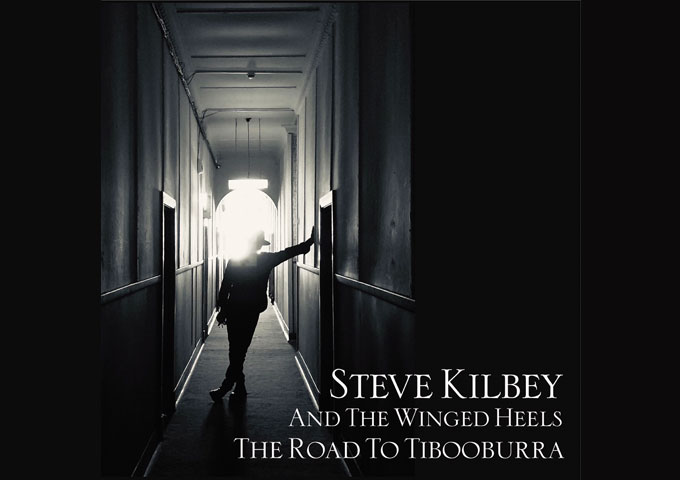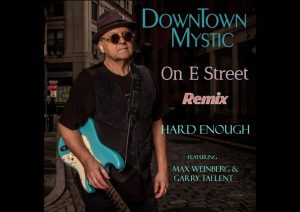Few artists embody the spirit of ceaseless reinvention quite like Steve Kilbey. Whether as the visionary behind The Church, a solo troubadour, or a collaborator in countless projects, Kilbey has spent decades weaving surreal soundscapes and poetic narratives. His latest venture, The Road to Tibooburra, is no exception—an album that is both a journey through the vast and mythical Australian outback and a meditation on the transient nature of fame, art, and self-discovery.
Joined by The Winged Heels—an ensemble of virtuosos featuring Gareth Koch, Roger Mason, and Barton Price—Kilbey delivers a collection of tracks that feel as expansive as the landscapes they evoke. The Road to Tibooburra stands at the crossroads of storytelling and sonic exploration, infused with rock, folk, psychedelia, and cinematic grandeur. What began as a soundtrack to a surrealist musical has emerged as something far more profound: a sonic novel filled with desert ghosts, faded glories, and the eternal quest for reinvention.
The origins of The Road to Tibooburra trace back to the early pandemic era, when Kilbey was cast in a silent film titled Space Junk. The film painted a portrait of an enigmatic traveler—played by Kilbey—wandering through a strange, pandemic-stricken town rife with extraterrestrial encounters and small-town hostility. Though Space Junk never reached a wide audience, its creator, Julian, envisioned a new direction: a full-fledged musical starring Steve Kilbey as “Lord Jim,” a washed-up rock star chasing a mythical comeback deep in the heart of Australia’s vast interior.
Kilbey, entrusted with composing the entire soundtrack, enlisted The Winged Heels to bring the vision to life. Yet, while the film remains incomplete, its music refused to be confined to an unfinished project. Instead, The Road to Tibooburra was born—a collection of songs that simultaneously stand alone and invite listeners to craft their own narratives, much like an unwritten novel where the plot unfolds in the listener’s imagination. The music, steeped in mysticism and nostalgia, exudes a cinematic quality, drawing from Kilbey’s own experiences as a restless traveler and eternal seeker of inspiration.
From the opening chords of Adrift, The Road to Tibooburra casts a hypnotic spell. The track unfurls with ethereal acoustic textures and Steve Kilbey’s unmistakable vocal delivery—world-weary yet laced with intrigue. It sets the tone for an album that, much like the titular journey, meanders through a myriad of sonic landscapes.
Silver City Highway emerges as one of the album’s defining moments, a pulsing, road-trip anthem that crackles with restless energy. Propelled by Barton Price’s thunderous drumming and electrifying guitar work from Koch and Mason, the track evokes a cinematic drive through endless highways and desolate townships—evoking a sense of movement and purpose, even as the lyrics hint at the existential void beneath. This track, in particular, highlights Kilbey’s ability to juxtapose the euphoria of freedom with the weight of introspection, making for an emotionally complex and deeply immersive listening experience.
Elsewhere, Too Late to Die Young injects a dose of reckless abandon, a nostalgic rock ’n’ roll ode that revels in its own irreverence. “Rock ’n’ roll is stupid, but it’s fun,” Kilbey sings over rollicking piano and jangling guitars, capturing the essence of an artist both embracing and mocking the mythos of his craft. There is a playfulness here, an acknowledgment of the absurdity of fame and fortune, yet an undeniable love for the art itself.
Morning After slows the tempo, inviting introspection with its folk sensibilities. Delicate acoustic guitars and understated percussion frame Steve Kilbey’s evocative storytelling, transforming the track into a reflective pause amid the album’s fevered motion. Lisa’s Song, with its haunting cello arrangements and melancholic melodies, takes on an almost cinematic quality, a moment of aching beauty within the album’s shifting sonic terrain. The track’s emotive depth stands out, carrying an air of longing and remembrance, as if it were a letter never sent, a story left unfinished.
The Spanish-inflected Desert Ship sees Koch’s classical guitar prowess take centerstage, weaving intricate, sun-drenched patterns over Kilbey’s atmospheric vocal delivery. The song’s dusky, hypnotic groove transports listeners into the heart of the Australian frontier, a place where past and present blur, and the road stretches endlessly into the horizon. This track is a testament to the album’s ability to evoke not just places, but entire moods—heat rising off the asphalt, the whisper of ancient spirits in the wind.
And then there’s Last Drinks, a fittingly raucous closer that encapsulates the album’s themes of exile and redemption. One can almost hear the echoes of a rowdy outback pub, the song’s chorus swelling with the voices of weary travelers and old souls gathered for one final toast to the road behind and the road ahead. The song feels like a farewell but also a promise—that the journey is never truly over.
While The Road to Tibooburra has its origins in a musical, it resists the constraints of a traditional soundtrack. Instead, it serves as a choose-your-own-adventure experience, allowing listeners to connect the dots in their own way. Some tracks directly reference the Lord Jim narrative, while others drift into more abstract territory, offering glimpses of Kilbey’s meditative musings on time, memory, and artistic reinvention.
Steve Kilbey himself embraces this ambiguity, stating, “These songs are in no particular order, so you’ll just have to figure it all out for yourself. Or just make up your own plot and story and sit back and enjoy.” This approach transforms the album into something more than just a collection of songs—it’s an interactive experience, an auditory expedition where meaning shifts with each listen. The listener becomes the traveler, piecing together fragments of the past while navigating the ever-changing present.
With The Road to Tibooburra, Steve Kilbey reaffirms his place as one of Australia’s most enduring and enigmatic artists. His ability to create worlds—whether through music, poetry, or visual art—remains unparalleled. The Winged Heels, a band of extraordinary musicians in their own right, elevate Kilbey’s vision, crafting a record that is as immersive as it is introspective.
Steve Kilbey’s career has been defined by an unyielding creative spirit, and The Road to Tibooburra is yet another testament to his boundless imagination. It is an album that captures the vastness of the Australian landscape, the echoes of past glories, and the relentless pursuit of something just out of reach. This is an album for seekers—those who crave adventure, those who ponder the nature of artistic legacy, and those who simply love getting lost in a great story. For those willing to embark on this journey, the road stretches ahead—winding, mysterious, and filled with stories waiting to be discovered.
OFFICIAL LINKS:
STREAM/DOWNLOAD: https://ffm.to/theroadtotibooburra
FACEBOOK: https://www.facebook.com/Kilbey.TheTimeBeing











More Stories
DownTown Mystic Roars Back with Timeless Swagger on “Hard Enough (Remix)”
Spiderweb Ignite a Six-String Revolution with “Bionic,” Featuring Steve Hackett, Kee Marcello and an All-Star Guitar Assembly for Charity
THRY’s “Relapse” Is a Fearless Portrait of Ambition, Absence, and Artistic Hunger